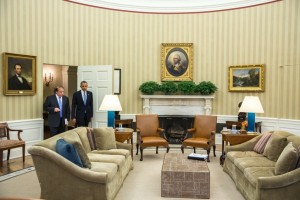Please support Marcy’s continued efforts to lead us through the weeds of obfuscation. The Emptywheel fundraiser is nearing its final push.
In my post yesterday morning on the French move to submit a United Nations Security Council resolution calling for Syria to surrender its chemical weapons to an international group for their safe destruction, I noted that this process naturally would require an immediate ceasefire. My underlying assumption was that the need for a ceasefire would be obvious to anyone giving the situation any thought. Personnel will need to move freely about the country to find and log the materials that will need to be destroyed. These materials will need to be moved to central locations for incineration or chemical processing to render them safe. If the personnel and the dangerous materials they will be transporting are attacked indiscriminately, the risk of releasing huge quantities of very dangerous agents looms large and the very process of trying to prevent civilian deaths could instead to lead to widespread lethal exposure.
Sadly, as I noted in the post, the French proposal does not appear to include a call for a ceasefire. Now that Russia is opposing the proposed language (because it calls for Syria to admit it carried out the August 21 attack and it includes a mandate for military action if Syria does not comply with the resolution), the opportunity exists for a new proposal to add the concept of a ceasefire.
Even more sad, though, is how our two leading bastions of foreign policy journalism, the New York Times and Washington Post, addressed the issue of how the chemical stockpiles can be destroyed. Both noted how “difficult” the process will be during the ongoing hostilities, but neither managed to point out the necessity of a ceasefire.
Here is how the Times addressed the issue:
As difficult as it may be to reach a diplomatic solution to head off a United States strike on Syria, the details of enforcement are themselves complex and uncertain, people with experience monitoring weapons facilities said.
Syria would first have to provide specifics about all aspects of its chemical weapons program. But even that step would require negotiation to determine exactly what should be declared and whether certain systems would be covered, because many delivery systems for chemical weapons — including artillery, mortars and multiple-rocket launchers — can also fire conventional weapons.
Then, experts said, large numbers of foreign troops would almost certainly be needed to safeguard inspectors working in the midst of the civil war.
“We’re talking boots on the ground,” said one former United Nations weapons inspector from Iraq, who spoke on the condition of anonymity because he still works in the field on contracts and did not want to hurt his chances of future employment. “We’re not talking about just putting someone at the gate. You have to have layers of security.”
Of course, many more “boots on the ground” are needed to protect the inspectors if there has not been a ceasefire negotiated and agreed to by both the Syrian government and the many factions of rebels fighting them. The Times even trots out the Pentagon estimate of how many troops would be required to secure the weapons in an invasion scenario:
A Pentagon study concluded that doing so would take more than 75,000 troops. That rough estimate has been questioned, but the official said it gave “a sense of the magnitude of the task.”
The Post does no better in its quest for just how the weapons could be secured and destroyed:
As diplomats wrangled over competing plans for securing Syria’s chemical weapons, arms-control experts warned Tuesday of the formidable challenges involved in carrying out such a complex and risky operation in the midst of a raging civil war.
U.N. teams dispatched to Syria for the mission would be attempting something new: finding and safeguarding a long-
hidden arsenal in a country that has long stood outside key international arms-control agreements — all while exposed to crossfire from Syria’s warring factions.
Poor Joby Warrick and his associates just can’t conceive of how the “crossfire” could end, even though the process of sending in the inspectors begins through UN negotiations.
Yes, there are many different factions on the “rebel” side in this conflict, but even brief investigation shows that many of them are actually proxies for several of the foreign powers that claim to have “interests” in Syria. A UN resolution that has at its heart a ceasefire would be a huge step toward showing that all of the various countries supporting militias in Syria intend to provide the opportunity for safe destruction of what could be the third largest repository of chemical weapons in the world. Although a truly international force of armed peacekeepers likely will be needed, sending them in without a ceasefire already negotiated would make the whole process of rounding up and destroying the chemical weapons a recipe for a humanitarian disaster of epic proportions.
Of course, a true optimist would note that a ceasefire would open the door to discussions to defuse political tensions within Syria while the process of destroying the chemical weapons is carried out. That would of course thwart those whose real objective is regime change in Syria through violent means but would perhaps create the opportunity for peaceful regime change. Is the world finally ready to give peace a chance after twelve years of unfocused rage?

